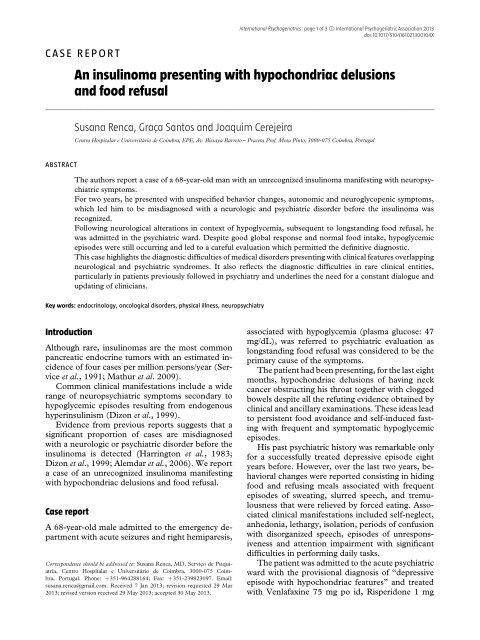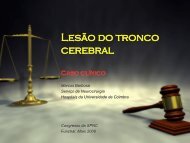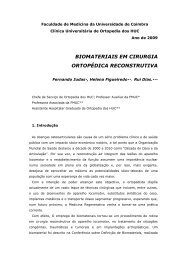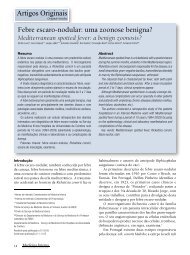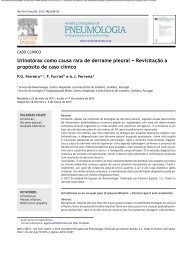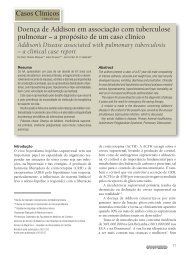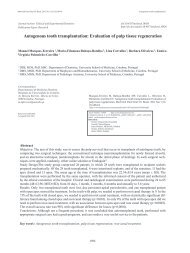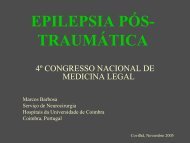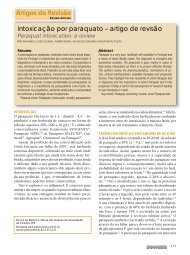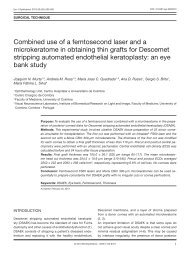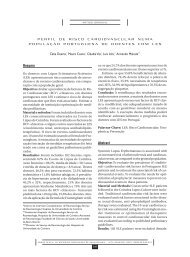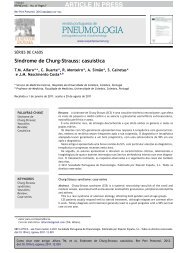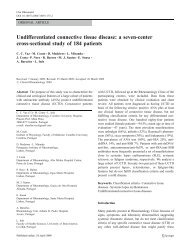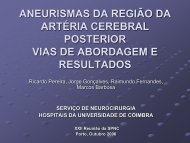An insulinoma presenting with hypochondriac delusions ... - RIHUC
An insulinoma presenting with hypochondriac delusions ... - RIHUC
An insulinoma presenting with hypochondriac delusions ... - RIHUC
Create successful ePaper yourself
Turn your PDF publications into a flip-book with our unique Google optimized e-Paper software.
CASE REPORT<br />
International Psychogeriatrics: page 1 of 3 C○ International Psychogeriatric Association 2013<br />
doi:10.1017/S104161021300104X<br />
<strong>An</strong> <strong>insulinoma</strong> <strong>presenting</strong> <strong>with</strong> <strong>hypochondriac</strong> <strong>delusions</strong><br />
and food refusal<br />
...........................................................................................................................................................................................................................................................................................................................................................................................................................................................................................................................................................................................................................................<br />
Susana Renca, Graça Santos and Joaquim Cerejeira<br />
Centro Hospitalar e Universitário de Coimbra, EPE, Av. Bissaya Barreto – Praceta Prof. Mota Pinto, 3000-075 Coimbra, Portugal<br />
ABSTRACT<br />
The authors report a case of a 68-year-old man <strong>with</strong> an unrecognized <strong>insulinoma</strong> manifesting <strong>with</strong> neuropsychiatric<br />
symptoms.<br />
For two years, he presented <strong>with</strong> unspecified behavior changes, autonomic and neuroglycopenic symptoms,<br />
which led him to be misdiagnosed <strong>with</strong> a neurologic and psychiatric disorder before the <strong>insulinoma</strong> was<br />
recognized.<br />
Following neurological alterations in context of hypoglycemia, subsequent to longstanding food refusal, he<br />
was admitted in the psychiatric ward. Despite good global response and normal food intake, hypoglycemic<br />
episodes were still occurring and led to a careful evaluation which permitted the definitive diagnostic.<br />
This case highlights the diagnostic difficulties of medical disorders <strong>presenting</strong> <strong>with</strong> clinical features overlapping<br />
neurological and psychiatric syndromes. It also reflects the diagnostic difficulties in rare clinical entities,<br />
particularly in patients previously followed in psychiatry and underlines the need for a constant dialogue and<br />
updating of clinicians.<br />
Key words: endocrinology, oncological disorders, physical illness, neuropsychiatry<br />
Introduction<br />
Although rare, <strong>insulinoma</strong>s are the most common<br />
pancreatic endocrine tumors <strong>with</strong> an estimated incidence<br />
of four cases per million persons/year (Service<br />
et al., 1991; Mathur et al. 2009).<br />
Common clinical manifestations include a wide<br />
range of neuropsychiatric symptoms secondary to<br />
hypoglycemic episodes resulting from endogenous<br />
hyperinsulinism (Dizon et al., 1999).<br />
Evidence from previous reports suggests that a<br />
significant proportion of cases are misdiagnosed<br />
<strong>with</strong> a neurologic or psychiatric disorder before the<br />
<strong>insulinoma</strong> is detected (Harrington et al., 1983;<br />
Dizon et al., 1999; Alemdar et al., 2006). We report<br />
a case of an unrecognized <strong>insulinoma</strong> manifesting<br />
<strong>with</strong> <strong>hypochondriac</strong> <strong>delusions</strong> and food refusal.<br />
Case report<br />
A 68-year-old male admitted to the emergency department<br />
<strong>with</strong> acute seizures and right hemiparesis,<br />
Correspondence should be addressed to: Susana Renca, MD, Serviço de Psiquiatria,<br />
Centro Hospitalar e Universitário de Coimbra, 3000-075 Coimbra,<br />
Portugal. Phone: +351-964288164; Fax: +351-239823097. Email:<br />
susana.renca@gmail.com. Received 7 Jan 2013; revision requested 29 Mar<br />
2013; revised version received 29 May 2013; accepted 30 May 2013.<br />
associated <strong>with</strong> hypoglycemia (plasma glucose: 47<br />
mg/dL), was referred to psychiatric evaluation as<br />
longstanding food refusal was considered to be the<br />
primary cause of the symptoms.<br />
The patient had been <strong>presenting</strong>, for the last eight<br />
months, <strong>hypochondriac</strong> <strong>delusions</strong> of having neck<br />
cancer obstructing his throat together <strong>with</strong> clogged<br />
bowels despite all the refuting evidence obtained by<br />
clinical and ancillary examinations. These ideas lead<br />
to persistent food avoidance and self-induced fasting<br />
<strong>with</strong> frequent and symptomatic hypoglycemic<br />
episodes.<br />
His past psychiatric history was remarkable only<br />
for a successfully treated depressive episode eight<br />
years before. However, over the last two years, behavioral<br />
changes were reported consisting in hiding<br />
food and refusing meals associated <strong>with</strong> frequent<br />
episodes of sweating, slurred speech, and tremulousness<br />
that were relieved by forced eating. Associated<br />
clinical manifestations included self-neglect,<br />
anhedonia, lethargy, isolation, periods of confusion<br />
<strong>with</strong> disorganized speech, episodes of unresponsiveness<br />
and attention impairment <strong>with</strong> significant<br />
difficulties in performing daily tasks.<br />
The patient was admitted to the acute psychiatric<br />
ward <strong>with</strong> the provisional diagnosis of “depressive<br />
episode <strong>with</strong> <strong>hypochondriac</strong> features” and treated<br />
<strong>with</strong> Venlafaxine 75 mg po id, Risperidone 1 mg
2 S. Renca et al.<br />
Plasma glucose mg/dL<br />
120<br />
100<br />
80<br />
60<br />
40<br />
20<br />
0<br />
0 2 4 6 8 10 12 14 16 18 20<br />
Hospitalizaon day<br />
Figure 1. (Colour online) Episode <strong>with</strong> symptoms of hypoglycemia<br />
(Plasma glucose: 42 mg/dL [
Insulinoma <strong>with</strong> neuropsychiatric symptoms 3<br />
Mathur, A., Gorden, P. and Libutti, S. K. (2009).<br />
Insulinoma. Surgical Clinics North America, 89,<br />
1105–1121.<br />
McCrimmon, R. J. (2012). Update in the CNS response to<br />
hypoglycemia. The Journal of Clinical Endocrinology and<br />
Metabolism, 97, 1–8.<br />
Service, F. J. (1999). Diagnostic approach to adults <strong>with</strong><br />
hypoglycemic disorders. Endocrinology and Metabolism<br />
Clinics of North America, 28, 519–532.<br />
Service, F. J., McMahon, M., O’ Brien, P. C. and<br />
Ballard, D. J. (1991). Functioning <strong>insulinoma</strong> –<br />
incidence, recurrence, and long-term survival of patients: a<br />
60-year study. Mayo Clinic Proceedings,. 66, 711–719.<br />
Vig, S., Lewis, M., Foster, K. J. and Stacey-Clear, A.<br />
(2001). Lessons to be learned: a case study approach<br />
<strong>insulinoma</strong> <strong>presenting</strong> as a change in personality. The<br />
Journal of the Royal Society for the Promotion of Health, 121,<br />
56–61.


